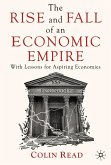- Gebundenes Buch
- Merkliste
- Auf die Merkliste
- Bewerten Bewerten
- Teilen
- Produkt teilen
- Produkterinnerung
- Produkterinnerung
'Transparency' has become both a catch-word in public debate and also an important research topic. Comprised of authoritative yet accessible contributions, this Handbook surveys existing economic research on transparency and provides an up-to-date account of its meaning and significance in economic policy, market integration and regulation, and corporate governance and disclosure.
Andere Kunden interessierten sich auch für
![The Oxford Handbook of Professional Economic Ethics The Oxford Handbook of Professional Economic Ethics]() The Oxford Handbook of Professional Economic Ethics181,99 €
The Oxford Handbook of Professional Economic Ethics181,99 €![The Oxford Handbook of the Economics of Religion The Oxford Handbook of the Economics of Religion]() The Oxford Handbook of the Economics of Religion199,99 €
The Oxford Handbook of the Economics of Religion199,99 €![Corporate and Institutional Transparency for Economic Growth in Europe Corporate and Institutional Transparency for Economic Growth in Europe]() Lars Oxelheim (ed.)Corporate and Institutional Transparency for Economic Growth in Europe169,99 €
Lars Oxelheim (ed.)Corporate and Institutional Transparency for Economic Growth in Europe169,99 €![The Oxford Handbook of Job Quality The Oxford Handbook of Job Quality]() The Oxford Handbook of Job Quality188,99 €
The Oxford Handbook of Job Quality188,99 €![The Oxford Handbook of American Economic History The Oxford Handbook of American Economic History]() The Oxford Handbook of American Economic History370,99 €
The Oxford Handbook of American Economic History370,99 €![The Rise and Fall of an Economic Empire The Rise and Fall of an Economic Empire]() Colin ReadThe Rise and Fall of an Economic Empire38,99 €
Colin ReadThe Rise and Fall of an Economic Empire38,99 €![The Oxford Handbook of Innovation The Oxford Handbook of Innovation]() Jan Fagerberg / David C. Mowery / Richard R. Nelson (eds.)The Oxford Handbook of Innovation66,99 €
Jan Fagerberg / David C. Mowery / Richard R. Nelson (eds.)The Oxford Handbook of Innovation66,99 €-
-
-
'Transparency' has become both a catch-word in public debate and also an important research topic. Comprised of authoritative yet accessible contributions, this Handbook surveys existing economic research on transparency and provides an up-to-date account of its meaning and significance in economic policy, market integration and regulation, and corporate governance and disclosure.
Hinweis: Dieser Artikel kann nur an eine deutsche Lieferadresse ausgeliefert werden.
Hinweis: Dieser Artikel kann nur an eine deutsche Lieferadresse ausgeliefert werden.
Produktdetails
- Produktdetails
- Oxford Handbooks
- Verlag: Oxford University Press; Oup Usa
- Seitenzahl: 614
- Erscheinungstermin: 1. Oktober 2014
- Englisch
- Abmessung: 249mm x 178mm x 41mm
- Gewicht: 1210g
- ISBN-13: 9780199917693
- ISBN-10: 0199917698
- Artikelnr.: 41202299
- Herstellerkennzeichnung
- Libri GmbH
- Europaallee 1
- 36244 Bad Hersfeld
- gpsr@libri.de
- Oxford Handbooks
- Verlag: Oxford University Press; Oup Usa
- Seitenzahl: 614
- Erscheinungstermin: 1. Oktober 2014
- Englisch
- Abmessung: 249mm x 178mm x 41mm
- Gewicht: 1210g
- ISBN-13: 9780199917693
- ISBN-10: 0199917698
- Artikelnr.: 41202299
- Herstellerkennzeichnung
- Libri GmbH
- Europaallee 1
- 36244 Bad Hersfeld
- gpsr@libri.de
Jens Forssbæck is an Associate Professor of Finance at Lund University School of Economics and Management and a fellow of the Knut Wicksell Centre for Financial Studies in Lund, Sweden. He holds a PhD in Finance from Copenhagen Business School and has held visiting positions at universities in France, the Netherlands, and the United Kingdom. His research lies mainly in the areas of international finance and financial intermediation, and he has been widely published in international scientific journals and in book form. Lars Oxelheim is Professor of International Business and Finance at Lund University School of Economics and Management (LUSEM), Lund, Sweden. He is affiliated with the Research Institute of Industrial Economics (IFN), Stockholm, Sweden and the School of Business and Law, University of Agder, Kristiansand, Norway. He is Honorary Professor at the Fudan University, Shanghai and the founding chairman of the Swedish Network for European Studies in Economics and Business (SNEE). Professor Oxelheim has published approximately 40 books and numerous scientific articles. He is an active member of several international research networks and serves on the editorial board of a number of journals.
* PART 1: INTRODUCTION
* 1. The Multi-Faceted Concept of Transparency
* Jens Forssbæck and Lars Oxelheim
* PART 2: POLICY TRANSPARENCY
* 2. Constitutional Transparency
* Richard J. Sweeney
* 3. Monetary Policy Transparency
* Petra M. Geraats
* 4. Fiscal Policy Transparency
* Iain Begg
* 5. Transparent and Unique Sovereign Default Risk Assessment
* Edward I. Altman and Herbert Rijken
* 6. Transparency and Competition Policy in an Imperfectly Competitive
World
* Philippe Gugler
* 7. Transparency in International Trade Policy
* Michael G. Plummer and Alissa Tafti
* 8. Transparency of Climate Change Policies, Markets, and Corporate
Practices
* Thomas L. Brewer and Michael Mehling
* 9. Transparency of Human Resource Policy
* Erik Mellander
* 10. Transparency of Innovation Policy
* Bo Carlsson
* PART 3: INSTITUTIONAL, MARKET AND REGULATORY TRANSPARENCY
* 11. Labor Market Transparency
* Eskil Wadensjö
* 12. Transparency in Financial Regulation
* James R. Barth, Apanard (Penny) Prabha, and Clas Wihlborg
* 13. Price Transparency and International Market Integration
* Richard Friberg
* 14. Transparency of Inward Investment Incentives
* Frederick Lehmann and Ana Teresa Lehmann
* 15. Transparency and Corruption
* Alvaro Cuervo-Cazurra
* PART 4: CORPORATE TRANSPARENCY
* 16. Multinational Corporations' Relationship with Political Actors:
Transparency versus Opacity
* Pervez N. Ghauri, Amjad Hadjikhani, and Cecilia Pahlberg
* 17. Corporate Governance and Optimal Transparency
* Tom Berglund
* 18. Transparency Differences at the Top of the Organization:
Market-Pull versus Strategic Hoarding Forces
* Winfried Ruigrok, Dimitrios Georgakakis, and Peder Greve
* 19 . Governance Transparency and the Institutions of Capitalism:
Implications for Finance
* Raj Aggarwal and John Goodell
* 20. Transparency and Executive Compensation
* Raghavendra Rau
* 21. Transparency and Disclosure in the Global Microfinance Industry
* Leif Atle Beisland, Roy Mersland, and Trond Randoy
* 22. Accounting Transparency and International Standard-Setting
* Sidney J. Gray and Helen Kang
* 23. Transparency of Fair Value Accounting and Tax
* Eva Eberhartinger and Soojin Lee
* 24. Transparency of Corporate Risk Management and Performance
* Peter McKay
* 25. Stress Testing, Transparency and Uncertainty in European Banking:
What impacts?
* Rym Ayadi and Willem Pieter De Groen
* 1. The Multi-Faceted Concept of Transparency
* Jens Forssbæck and Lars Oxelheim
* PART 2: POLICY TRANSPARENCY
* 2. Constitutional Transparency
* Richard J. Sweeney
* 3. Monetary Policy Transparency
* Petra M. Geraats
* 4. Fiscal Policy Transparency
* Iain Begg
* 5. Transparent and Unique Sovereign Default Risk Assessment
* Edward I. Altman and Herbert Rijken
* 6. Transparency and Competition Policy in an Imperfectly Competitive
World
* Philippe Gugler
* 7. Transparency in International Trade Policy
* Michael G. Plummer and Alissa Tafti
* 8. Transparency of Climate Change Policies, Markets, and Corporate
Practices
* Thomas L. Brewer and Michael Mehling
* 9. Transparency of Human Resource Policy
* Erik Mellander
* 10. Transparency of Innovation Policy
* Bo Carlsson
* PART 3: INSTITUTIONAL, MARKET AND REGULATORY TRANSPARENCY
* 11. Labor Market Transparency
* Eskil Wadensjö
* 12. Transparency in Financial Regulation
* James R. Barth, Apanard (Penny) Prabha, and Clas Wihlborg
* 13. Price Transparency and International Market Integration
* Richard Friberg
* 14. Transparency of Inward Investment Incentives
* Frederick Lehmann and Ana Teresa Lehmann
* 15. Transparency and Corruption
* Alvaro Cuervo-Cazurra
* PART 4: CORPORATE TRANSPARENCY
* 16. Multinational Corporations' Relationship with Political Actors:
Transparency versus Opacity
* Pervez N. Ghauri, Amjad Hadjikhani, and Cecilia Pahlberg
* 17. Corporate Governance and Optimal Transparency
* Tom Berglund
* 18. Transparency Differences at the Top of the Organization:
Market-Pull versus Strategic Hoarding Forces
* Winfried Ruigrok, Dimitrios Georgakakis, and Peder Greve
* 19 . Governance Transparency and the Institutions of Capitalism:
Implications for Finance
* Raj Aggarwal and John Goodell
* 20. Transparency and Executive Compensation
* Raghavendra Rau
* 21. Transparency and Disclosure in the Global Microfinance Industry
* Leif Atle Beisland, Roy Mersland, and Trond Randoy
* 22. Accounting Transparency and International Standard-Setting
* Sidney J. Gray and Helen Kang
* 23. Transparency of Fair Value Accounting and Tax
* Eva Eberhartinger and Soojin Lee
* 24. Transparency of Corporate Risk Management and Performance
* Peter McKay
* 25. Stress Testing, Transparency and Uncertainty in European Banking:
What impacts?
* Rym Ayadi and Willem Pieter De Groen
* PART 1: INTRODUCTION
* 1. The Multi-Faceted Concept of Transparency
* Jens Forssbæck and Lars Oxelheim
* PART 2: POLICY TRANSPARENCY
* 2. Constitutional Transparency
* Richard J. Sweeney
* 3. Monetary Policy Transparency
* Petra M. Geraats
* 4. Fiscal Policy Transparency
* Iain Begg
* 5. Transparent and Unique Sovereign Default Risk Assessment
* Edward I. Altman and Herbert Rijken
* 6. Transparency and Competition Policy in an Imperfectly Competitive
World
* Philippe Gugler
* 7. Transparency in International Trade Policy
* Michael G. Plummer and Alissa Tafti
* 8. Transparency of Climate Change Policies, Markets, and Corporate
Practices
* Thomas L. Brewer and Michael Mehling
* 9. Transparency of Human Resource Policy
* Erik Mellander
* 10. Transparency of Innovation Policy
* Bo Carlsson
* PART 3: INSTITUTIONAL, MARKET AND REGULATORY TRANSPARENCY
* 11. Labor Market Transparency
* Eskil Wadensjö
* 12. Transparency in Financial Regulation
* James R. Barth, Apanard (Penny) Prabha, and Clas Wihlborg
* 13. Price Transparency and International Market Integration
* Richard Friberg
* 14. Transparency of Inward Investment Incentives
* Frederick Lehmann and Ana Teresa Lehmann
* 15. Transparency and Corruption
* Alvaro Cuervo-Cazurra
* PART 4: CORPORATE TRANSPARENCY
* 16. Multinational Corporations' Relationship with Political Actors:
Transparency versus Opacity
* Pervez N. Ghauri, Amjad Hadjikhani, and Cecilia Pahlberg
* 17. Corporate Governance and Optimal Transparency
* Tom Berglund
* 18. Transparency Differences at the Top of the Organization:
Market-Pull versus Strategic Hoarding Forces
* Winfried Ruigrok, Dimitrios Georgakakis, and Peder Greve
* 19 . Governance Transparency and the Institutions of Capitalism:
Implications for Finance
* Raj Aggarwal and John Goodell
* 20. Transparency and Executive Compensation
* Raghavendra Rau
* 21. Transparency and Disclosure in the Global Microfinance Industry
* Leif Atle Beisland, Roy Mersland, and Trond Randoy
* 22. Accounting Transparency and International Standard-Setting
* Sidney J. Gray and Helen Kang
* 23. Transparency of Fair Value Accounting and Tax
* Eva Eberhartinger and Soojin Lee
* 24. Transparency of Corporate Risk Management and Performance
* Peter McKay
* 25. Stress Testing, Transparency and Uncertainty in European Banking:
What impacts?
* Rym Ayadi and Willem Pieter De Groen
* 1. The Multi-Faceted Concept of Transparency
* Jens Forssbæck and Lars Oxelheim
* PART 2: POLICY TRANSPARENCY
* 2. Constitutional Transparency
* Richard J. Sweeney
* 3. Monetary Policy Transparency
* Petra M. Geraats
* 4. Fiscal Policy Transparency
* Iain Begg
* 5. Transparent and Unique Sovereign Default Risk Assessment
* Edward I. Altman and Herbert Rijken
* 6. Transparency and Competition Policy in an Imperfectly Competitive
World
* Philippe Gugler
* 7. Transparency in International Trade Policy
* Michael G. Plummer and Alissa Tafti
* 8. Transparency of Climate Change Policies, Markets, and Corporate
Practices
* Thomas L. Brewer and Michael Mehling
* 9. Transparency of Human Resource Policy
* Erik Mellander
* 10. Transparency of Innovation Policy
* Bo Carlsson
* PART 3: INSTITUTIONAL, MARKET AND REGULATORY TRANSPARENCY
* 11. Labor Market Transparency
* Eskil Wadensjö
* 12. Transparency in Financial Regulation
* James R. Barth, Apanard (Penny) Prabha, and Clas Wihlborg
* 13. Price Transparency and International Market Integration
* Richard Friberg
* 14. Transparency of Inward Investment Incentives
* Frederick Lehmann and Ana Teresa Lehmann
* 15. Transparency and Corruption
* Alvaro Cuervo-Cazurra
* PART 4: CORPORATE TRANSPARENCY
* 16. Multinational Corporations' Relationship with Political Actors:
Transparency versus Opacity
* Pervez N. Ghauri, Amjad Hadjikhani, and Cecilia Pahlberg
* 17. Corporate Governance and Optimal Transparency
* Tom Berglund
* 18. Transparency Differences at the Top of the Organization:
Market-Pull versus Strategic Hoarding Forces
* Winfried Ruigrok, Dimitrios Georgakakis, and Peder Greve
* 19 . Governance Transparency and the Institutions of Capitalism:
Implications for Finance
* Raj Aggarwal and John Goodell
* 20. Transparency and Executive Compensation
* Raghavendra Rau
* 21. Transparency and Disclosure in the Global Microfinance Industry
* Leif Atle Beisland, Roy Mersland, and Trond Randoy
* 22. Accounting Transparency and International Standard-Setting
* Sidney J. Gray and Helen Kang
* 23. Transparency of Fair Value Accounting and Tax
* Eva Eberhartinger and Soojin Lee
* 24. Transparency of Corporate Risk Management and Performance
* Peter McKay
* 25. Stress Testing, Transparency and Uncertainty in European Banking:
What impacts?
* Rym Ayadi and Willem Pieter De Groen








